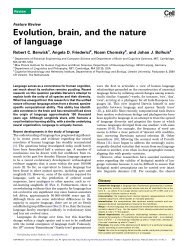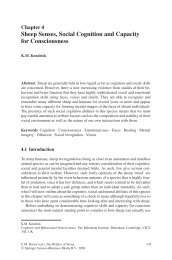Ulric Neisser
Ulric Neisser
Ulric Neisser
You also want an ePaper? Increase the reach of your titles
YUMPU automatically turns print PDFs into web optimized ePapers that Google loves.
perception.There is always information in the light to specify how we are moving and what we<br />
are doing - i.e., to specify what I was beginning to call the "ecological self." Recent work on<br />
perception in infancy, much of it from Eleanor Gibson's baby lab, had suggested that even very<br />
young infants are self-aware in this sense. On the other hand I had often read claims by social<br />
psychologists and anthropologists that the self is nothing but a social construction, varying<br />
greatly from one society to the next. How could these disparate views of the self be reconciled?<br />
To solve this puzzle I addressed it in the language of cognitive psychology, i.e., by<br />
thinking in terms of information. On reflection, this approach suggested that the self is specified<br />
by no less than five different types of information and hence that there are five different kinds of<br />
self-knowledge. Another way of putting it is to say that people have five different "selves" - the<br />
ecological self, the interpersonal self, the conceptual self, the remembered self, and the private<br />
self. Having drafted a theoretical paper to this effect, I began to wonder where I could publish it.<br />
That problem was resolved when I happened to meet John Rust in London: he was just then<br />
starting a new journal called Philosophical Psychology, which sounded fine to me (<strong>Neisser</strong>,<br />
1998).<br />
One day at Oxford I got an unexpected phone call from Billy Frye, the Emory Provost.<br />
The University had received a substantial grant from the Mellon Foundation; could I help them<br />
find a way to spend the money? All I could think of was an expanded version of what the<br />
Cognition Project was doing already, focused more directly on the five kinds of self-knowledge.<br />
This was not a very imaginative idea, but it seemed practical. I recruited an excellent post-doc -<br />
David Jopling, whose degree was in philosophy - and together we conducted five stimulating<br />
conferences on self-knowledge. Eventually, these became three volumes in the Emory<br />
Symposium series. I edited The Perceived Self (1993) myself, co-edited The Remembering Self<br />
(1994) with Robyn Fivush, and finally co-edited The Conceptual Self in Context (1997) with<br />
Jopling. I had high hopes that all this would have some impact on other people's theorizing about<br />
the self, but have seen little evidence of it.<br />
The APA task force<br />
Published in 1994, Herrnstein and Murray's book The Bell Curve immediately sparked a<br />
firestorm of controversy. The controversy peaked in the spring of 1995, when I happened to be<br />
serving on the American Psychological Association (APA) Board of Scientific Affairs. The<br />
Board decided that APA should establish a task force to address the issues that The Bell Curve<br />
had raised - issues of race, education, genetics, intelligence, and the like. Then, they asked me to<br />
chair it. I was chosen partly because I just happened to be there, but also because I might actually<br />
be a good person for the job. I still had some name recognition; what's more, I knew something<br />
about the topic and yet had written so little about it that no one was mad at me. At least, those<br />
were my reasons for accepting.<br />
I picked a good committee (some of the members were suggested by various<br />
constituencies) and we soon set to work, deciding on the structure of the report and who would<br />
write the drafts of various sections. I kept the "group differences" section for myself. We<br />
circulated drafts by e-mail, and found surprisingly few disagreements on substantive issues. My<br />
own position was that the Black/White differences are real and important, but that their cause is<br />
not presently known. We worked quickly; the report - "Intelligence: Knowns and unknowns"<br />
(1996) - appeared in American Psychologist only a year later. It triggered critical responses from<br />
both left and right, which I took as a sign that we had written a fair report.<br />
16




